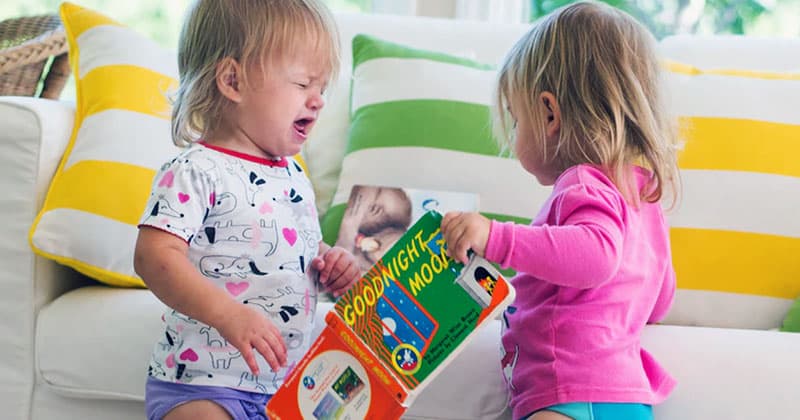Is your toddler throwing tantrums and are they getting worse? You probably don’t need to worry too much. Tantrums from a toddler of 18 months, 2 years old or 3 years old are common. And, importantly, some fairly simple techniques can be used to help tame toddler tantrums.
Dictionaries define a “tantrum” simply as a “fit of bad temper” or an “outburst”. Honestly, temper tantrums are normal and a fact of toddler life. Tantrums are virtually universal among kids of this age. For some, they begin as early as around their 1st birthday, peaking for some while aged 2, and continuing in many kids beyond age 3.
Tantrums occur in 87% of 18 to 24-month-olds, 91% of 30 to 36-month-olds, and 59% of 42 to 48-month-olds. It is common for toddlers to have a tantrum at least once per day, as is the case for 20% of two-year-olds, 18% of three-year-olds, and 10% of four-year-olds. Five to seven percent of one-to three-year-olds have tantrums lasting at least fifteen minutes three or more times per week.
Sisterhen and Wy (2020)
The most important point to remember is that toddlers aren’t bad when they’re having tantrums. They’re just acting their age. As a matter of fact, kids of all ages and even adults throw tantrums.
We all get frustrated at sometime for some or the other reason. The only difference is that, as adults, we have more control of the environment around us. And we have more practice dealing with frustrations, annoying circumstances and having to wait for something.
Realizing that tantrums are not the exclusive province of toddlers – and, rather, a behavior we’re all susceptible to sometimes – should help put these emotional displays in perspective.
Reasons for Toddler Tantrums

A toddler tantrum is an expression of one or more negative feelings. They are also an attempt to communicate something. You may notice that the tantrum will tend to stop if everyone else leaves the room for example.
Here are some possible feelings that your toddler may be expressing when throwing a tantrum. The outbursts are most likely to happen when multiple factors combine to overwhelm the little one. You could feel the same way if, for example, you were having a bad morning and then something else happened to top it off.
- Need to release frustration. The toddler’s strong drives for mastery and autonomy are continually stymied, either by adults or by their own limitations. I still remember my son used to shout when he couldn’t make a tower of blocks higher than himself. All such instances when kids try to do something and not able to accomplish make them feel incapable. Don’t you think its same reaction we also show when we’re not able to do our tasks? The only difference is we understand our limitations and ways to overcome it.
- Need to express their feelings, needs and wishes. Most toddlers don’t yet the language skills to do this. For them, a tantrum speaks louder than words. Do you remember how you felt as a child when you strongly wished to buy something, and your mother said “No”. Toddlers go through similar feelings when they’re abstained from doing things they wanted to. I can see myself in my son and that helps me to understand him, but there are times when I loose my temper as well.
- The need to assert themselves and to send the message “I am important. What I want counts”. After completing their first year and accomplishing so many physical milestones, kids start feeling as independent individuals. So, they try to do things on their own and show assertion when denied something.
- Lack of control over their lives. With the adults always telling them what to do and what not to do, a tantrum is the only way toddler can say “Enough. This is my life”.
- Hunger, exhaustion, over-stimulation or boredom. These are also the reasons which may affect an adult and toddlers are quite sensitive to these. You must have faced your toddler throwing a tantrum after a whole day outing while coming back, simply because they’re too tired and maybe hungry to express.
Though virtually every toddler has a tantrum now and then, some are especially tantrum-prone. Around 1 in 16 toddlers have a long tantrum (15 minutes or more) three or more times a week.
Factors Behind Tantrums Getting Worse
- Genetic Predisposition: Some children are born with temperamental qualities that predispose them to more frequent tantrums. For example: persistence or stubbornness: toddlers who are involved in some engaging activity find it impossible to leave it and get ready for any other activity let say going to school or going to bed, high intensity: kids with lot of energy and their reaction to anything is kicking or screaming. My son is a stubborn, it’s a ritual for me to get him ready for school, despite the fact he gets up quite early in the morning, we always end up running after the bus, simply because he gets into his toy room and want to play sometime before getting ready to school.
- Extremes of Discipline: In a chronically permissive atmosphere conspicuously lacking in limits, children may ‘act out’ or misbehave in a cry for external control. In an overtly strict environment, the child may explode in hope of expanding boundaries that are too tight.
- A history of Illness, chronic disabilities, or health problems. Parents are more likely to treat a child as ‘special’ who has some serious medical condition, who has been born after long period of trying. Because of lack of discipline and limits, these children may be prone to tantrums. Toddlers who are suffering from speech problems or hearing impaired and problems like autism or other serious developmental disability, may throw tantrums due to their lack of communication.
- A parent-child personality clash. Let’s suppose you are outgoing but your child is shy, then you may wrongly push your child to get involved in outdoor activities. This frustration ad conflict in personality may result in tantrums.
- Parental personal problems, such as depression, overwork, worry, illness or financial difficulties. Generally, such parental problems affect toddler so much due to parent’s affected mood that it result in tantrums.I remember that when I was working due to work pressure I started remaining quite irritated, that resulted in my son getting gloomy and grumpy. In order to get attention from me, he used to throw tantrums. But luckily, I understood the problem and handled it at the right time.
- Divorced or Separate parents: The custodial parent may be overwhelmed by solo child-care chores and have little time for the toddler. In such cases the frustrated child may learn to use tantrums to control parents.
Now when we have understood the reasons, that why kids throw tantrums and at times more frequent tantrums, you must be wondering, if there is a way to handle these tantrums. The answer is “yes”, definitely there are ways, but before I start discussing them, a word of advice, you need to be patient, ready to give undivided attention to your toddler and maintain your calm while handling such situations. It’s easier said than done, but trust me it’s not impossible either.
Taming Toddler Tantrums by Prevention
Prevention is the best defense against tantrums. I know you must be thinking tantrums are not planned so how can we prevent them. But my dear friend, there is a cause for every tantrum and if we can identify, then we can wave off almost 70-80% of tantrums, yes that’s true. So if you have started observing a sudden surge of tantrums in your toddler, you need to find out the reason.
For this, start keeping record of your toddler’s tantrums for a week or two, noting when they occur (time of day, before or after naps, meals and so on; following a particular event), why (hunger, fatigue, restrictions, frustrations). After two week’s of time, examine the record if you find any pattern and try to uncover toddler’s most common tantrum triggers, the set out to modify or eliminate them using the following principles.
- Make sure you give your child enough opportunity to let off steam. Encourage your child to express anger or frustration verbally or to release them in more acceptable ways. If his or her language skills are not up to it yet, help out “Are you angry because you are not able to build that tower or fit that puzzle?” When your toddler replies is affirmation, explain him that “It happens and no one is perfect and with practice he will be able to do it perfectly and with ease.”
- As we have discussed many times, setting a routine for your kid is must, but few kids like to follow it religiously while other like to have changes, so your task is to understand what your child like and then tailor his routine accordingly. If a kid gets regular routine of nap, bath and meals, I can say that half of the problem is solved.
- This is one is true for 90% of kids, don’t let your toddler go for long stretches without food. Carry nutritious snacks whenever you go out and don’t wait until behavior gets out of hand. The same applies for nap time, don’t go out near nap time, most of the kids get cranky near their nap time and particularly for those bundle of energies, who don’t sleep during day time.
- Reduce the need to say ‘no’. A parent’s negativity is often the trigger for a child’s tantrums. Childproof your home and setting clear and consistent limits to reduce your need to say ‘no’. To achieve compliance, use more games and challenges and fewer absolute directives, which risk being refused.
- When possible say ‘yes’. Instead of issuing an automatic ‘no’ to your toddler every time you your toddler asks for something, consider whether there’s really any good reason not to say ‘yes’. Giving an okay is initially better than giving in under duress after a tantrum begins. When you cannot give an unconditional okay, try negotiating.
- Provide choices when possible. Kids feel independent when they have opportunity to make decisions of their own, ‘Do you want to play with blocks or cars?’ or ‘Do you want to read this book or that one?’ This helps toddler feel more in control, reducing the chance for tantrum.
- Keep your toddler from going over the edge. When you see your child tottering on the brink of frustration, exhaustion, over stimulation or boredom, divert attention towards something calming, soothing or interesting like your toddler’s special toy or song, a hug, a special book or special place in house. Diverting attention is the most effective technique, you need to know your kid’s preferences to do it successfully.
- Stick to your principles when a tantrum occurs. If you give into a tantrum – you relent and buy that toy or chocolate just to avoid your kid’s screaming in public – you’re only reinforcing your toddler’s trick and setting stage for next tantrum.
- Commend good behavior and even neutral behavior. When your child doesn’t show tantrums and have been good, let him know that how much you appreciate his co-operation. This will re-enforce him to repeat that behavior to be appreciated and accepted by you.
